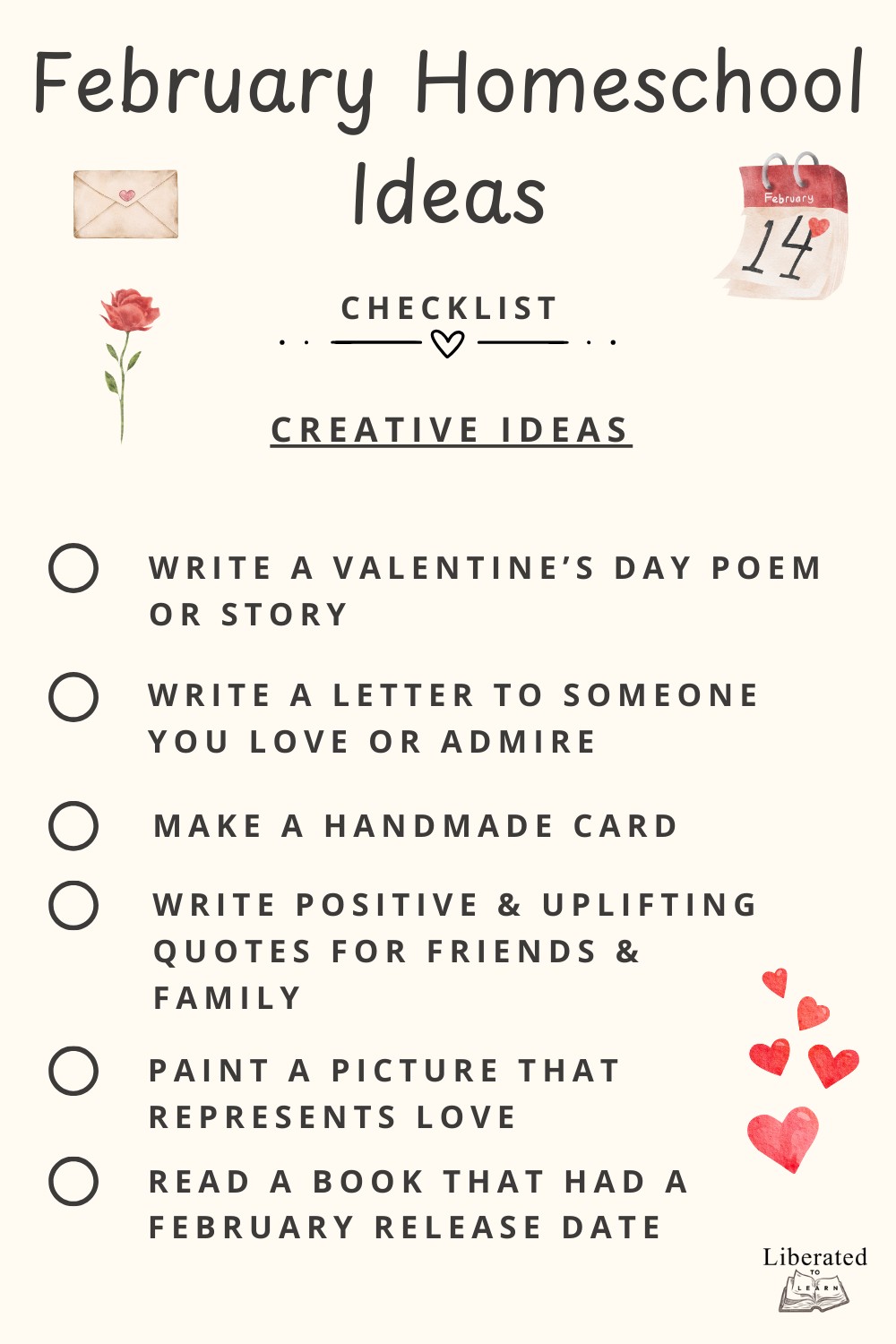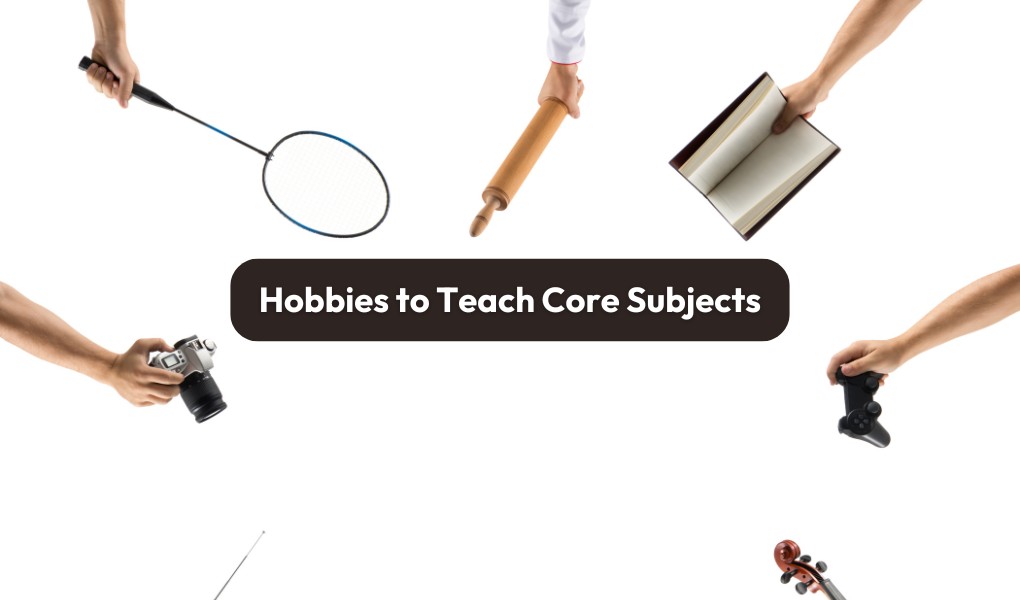If you’re looking for some great homeschool learning ideas for February, look no further! We’re sharing some February homeschool learning ideas for specific subjects, and have even included a February learning ideas checklist!

Contents
If you’re looking for some great homeschool learning ideas for February, look no further! We’re sharing some February homeschool learning ideas for specific subjects, and have even included a February learning ideas checklist! Let’s dive in!

February Homeschool Learning Ideas (By Subject)
Creative ideas:
- Write a Valentine’s Day poem or story.
- Write a letter to someone you love or admire.
- Make a handmade card.
- Write positive & uplifting quotes for your friends and family, or the elderly in a care home.
- Paint a picture that represents love.
- Read a book that had a February release date.
- Read a book about love and friendship.
- Create an acronym using the word ‘LOVE’
- Craft a heart wreath.
- Recreate symbols of peace and love.
- Write and sing a song about love or winter.
- Create and act out a romantic play.
- Do a Valentine’s craft.
- Make a snow or Valentine’s themed sensory bin.
- Create a gratitude wall, filled with love and gratefulness.
- Make a winter diorama.
- Make a playlist of love songs and have a sing-a-long.
- Study words related to kindness and friendship for Valentine’s Day.
- Learn the synonyms and antonyms of winter and love-themed words.
- Make or do a Valentine’s colouring book.
- Create a ‘love tree’ and write things you love about your friends and family, or the world, on paper leaves or hearts.
Science ideas:
- Learn about how digestion works after eating your favourite Valentine’s treats.
- Learn about magnetism and use it as a metaphor for attraction.
- Learn about the anatomy of a human heart and create a model.
- Learn about different animal interactions and relationships, such as which animals mate for life.
- Make homemade rock candy as a Valentine’s treat and discuss crystal formation.
- Study heartbeats and use a stopwatch to measure active and resting heart rates.
- Create winter animal fact cards.
- Place an object on a sunny windowsill or outside. Trace the shadow at different times of the day and write down why it changes.
- Test how objects slide on ice and other surfaces to explore friction.
- Learn about hibernation and the habit of winter animals.
- Learn about the changing seasons and look for signs of spring.
- Build a stick or straw bridge and test its strength with different weights.
- Place sweets or love hearts in different liquids, like water or vinegar, and observe which dissolves faster. Discuss why some liquids dissolve sugar faster than others.
- Learn about germination and plant growth by growing seeds indoors.
- Build a DIY kaleidoscope.
Maths ideas:
- Use heart-shaped objects or chocolates and cookies for counting and fractions.
- Create a calendar and calculate the days until spring.
- Learn about patterns and shapes by creating heart mosaics.
- Create a budget for a Valentine’s Day party.
- Graph weather changes throughout February.
- Cut out heart shapes and estimate or calculate their area and measure their perimeter.
- Come up with Valentine’s maths problems like, “If you each give 3 cards to 6 friends, how many cards do you need in total?”
- Draw or cut out icicle shapes and use mirrors to explore symmetry, then calculate reflection angles.
- Bake a Valentine’s cake by measuring ingredients and discussing ratios.
Geography & History ideas:
- Research the origins of Valentine’s Day.
- Learn about famous people from history who were born in February, like Charles Dickens.
- Learn about how Valentine’s Day is celebrated around the world.
- Make a timeline of a historical event that happened in February.
- Research Valentine’s Day traditions in other countries.
- Learn and compare winter weather in different countries.
- Study the Aurora Borealis and map where it is most visible.
- Discuss how seasons differ in the northern and southern hemispheres.
- Learn about longitude and time zones.
- Read famous historical love letters and study the significance of written correspondence.
- Compare historical maps to modern maps and discuss how boundaries and countries evolved over time.
- Learn about the Celtic Imbolc festival.
- Learn about Candlemas.
Life skill ideas:
- Learn how to make Valentine’s treats like cookies and cakes.
- Cook a hearty meal for someone you love.
- Do a good deed or volunteer as a family.
- Make care packages or cards for local shelters or care homes.
- Learn about growing vegetables and plants in February.
- Discuss how winter affects energy bills and ways to save energy.
- Learn how to prepare for winter weather and manage during the colder months.
- Learn how to repair winter clothing through stitching and sewing.
- Learn how to care for your skin in winter and make homemade lip balm or moisturiser.
- Start decluttering for spring.
- Practise first aid for common winter injuries.
- Learn some survival skills, like how to build a fire.
Outdoor & physical activity ideas:
- Try out a February fitness challenge.
- Play ‘Cupid Says’ (like Simon Says) to stay active indoors.
- Create an outdoor Valentine’s scavenger hunt.
- Create bingo cards for a nature walk.
- Search for different colours of winter and take photos.
- Do a heart-shaped relay race.
- Set up targets and have your kids pretend to be cupid and aim for them.
- Play hide and seek outside and learn about hibernation.
- Play capture the flag, but make it Valentine’s-themed.
- Identify trees on a nature walk.
- Get binoculars and go birdwatching.
- Do a winter bonfire and learn about combustion.
- Go stargazing and discuss why stars are brighter in winter.

Download the February Homeschool Topics Checklist!
February Homeschool Learning Topics
Here’s a list of some ideal topics to learn about in February!
- The origins of Valentine’s Day
- Valentine’s Day around the world
- Winter animals and landscapes
- Weather in February in different countries
- Imbolc festival
- Candlemas
- Famous February birthdays
- Historical events in February
- Medieval winter traditions
- Stargazing and constellations in February
- The changing seasons
Tips for Homeschooling in February
February may be the second month of the year, but often we are still finding our feet. So, here are some tips for homeschooling in February.
Embrace the season
If you’re in the northern hemisphere, it will likely still be very cold and you’ll probably be urging spring to hurry up. But embracing the winter will make homeschooling more enjoyable and encourage you to do a lot more, especially outside.
Even on cold days, you can bundle up and plan outdoor activities. And you can use the weather to your advantage by making it a learning opportunity.
Combat mid-winter fatigue
February can start to feel quite monotonous, especially after getting through January, which is why it’s usually the best time to try new things and experiment. To combat that mid-winter fatigue, assess what’s working and what’s not, then you can always adjust what you need to.
Create a cosy atmosphere
If you’re spending a lot of time indoors, why not create a more cosy atmosphere? Blankets, fairy lights, or even a warm drink station definitely make your homeschool space feel more inviting.
Reflect on progress
It’s an ideal time to reflect on January’s achievements and celebrate milestones from the previous month as this sets a positive tone for February and the upcoming months. And after reflecting on progress, you can start working towards new goals.
Stay flexible and enjoy the season
The most important tip of all is to enjoy the season, no matter what. Stay flexible and open-minded to avoid stress and prioritise family bonding with fun activities as well as great learning ideas. You could even end the month with a fun celebration to mark what you’ve all accomplished.

m@liberated
Want more from Liberated to Learn?
Subscribe to stay updated about new posts, resources and giveaways!












